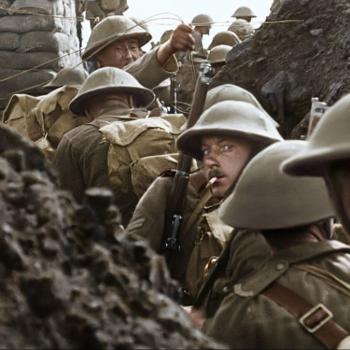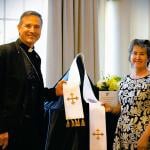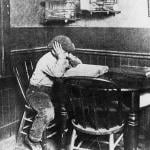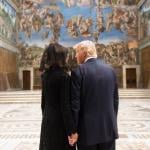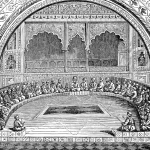“I want to be blunt with you,” the priest said to me. He was behind a curtain, and had just digested my confession. “It sounds,” he said, “like you’ve got a really ungrateful heart.”
Today, memorial day, I found myself beside a creek, watching the birds wash, breathing in the smells of spring, loving the presence of my future wife, and truly enjoying the freedoms that countless soldiers have died for, but mostly killed for.
I am grateful for these freedoms. But I feel torn by the idea that these freedoms have been purchased with blood – as I am told so often. But I wonder – whose blood? American blood? French and Indian blood? British blood? Spanish blood? Mexican blood? German blood? Italian blood? More German blood? Japanese blood? Iraqi blood? Iranian blood?
Whose blood must be shed for me to enjoy a freedom filled life? The blood of my friends or the blood of my freedom-hating enemies? Both? We are often told, on Memorial Day, that American blood has purchased our freedom. No one mentions the enemy’s blood. But General Patton points out the truth:
Now I want you to remember that no bastard ever won a war by dying for his country. You won it by making the other poor dumb bastard die for his country.
And so I am torn. I am grateful for my freedom, but ungrateful for the violence done to secure that freedom. There are only a few ways out of this conflict:
1) Become ungrateful for my freedom.
2) Become grateful for the violence done to secure my freedom.
3) Deny that I am free.
4) Deny that violence secured my freedom.
 Option 1 is the most natural, and it is the tendency that drove me to confession. I find myself feeling ungrateful for things which are good – which is insane. I’ve prayed for gratefulness, and have begun to feel it. But as my gratefulness has grown, I’ve felt the conflict growing. How can I be grateful for freedom purchased with bloodshed which I abhor?
Option 1 is the most natural, and it is the tendency that drove me to confession. I find myself feeling ungrateful for things which are good – which is insane. I’ve prayed for gratefulness, and have begun to feel it. But as my gratefulness has grown, I’ve felt the conflict growing. How can I be grateful for freedom purchased with bloodshed which I abhor?
Option 2 wants me to honor the bloodshed I abhor. But this is impossible. I have committed myself to the “nonviolence of the cross” (P.B.XVI), and believe in its unique power to defeat evil.
Option 3 would quickly resolve my conflict. If I am not free, then there’s nothing to be grateful for. But this is manifestly incorrect – as my freedom to blog shows.
Option 4? Deny that violence secured my freedom? Did warfare free me? Has violence freed me?
“The Lord has triumphed upon the cross. He did not triumph with a new empire, with a power greater than the others and capable of destroying them; he triumphed, not in a human way, as we would imagine, with an empire more powerful than the other. He triumphed with a love capable of reaching even to death . . .
This is God’s new way of winning: he does not oppose violence with a stronger form of violence. He opposes violence with its exact opposite: love to the very end, his cross. This is God’s humble way of winning: with his love – and this is the only way it is possible – he puts a limit on violence. This is a way of winning that seems very slow to us, but it is the real way to overcome evil, to overcome violence, and we must entrust ourselves to this divine way of winning.” – Pope BXVI
I will be bold here. No one, not one, has dared to refute what the Pope has said here. Those who disagree ignore it. I have yet to hear one semi-reasoned dismissal of the Pope’s words, for one clear reason – the Pope is clearly and adamantly claiming that Christ’s victory extends into the real world. Benedict claims that Christ’s victory on the cross isn’t merely a cosmic realignment of spiritual scales that allows us to get into heaven while condemning us to hell on earth. No. Christ’s victory defeats evil in this world. Christ’s love defeats violence in this world – individually, socially, and yes – even politically.
War and violence – killing – have never and will never purchase freedom or peace. While condoning violence as an ultimately futile form of self-defense, the Church always has and always will proclaim that true freedom and true peace come through Christ and Christ’s love alone.
“The Church teaches that true peace is made possible only through forgiveness and reconciliation.”
“With the conviction of her faith in Christ and with the awareness of her mission, the Church proclaims “that violence is evil, that violence is unacceptable as a solution to problems, that violence is unworthy of man. Violence is a lie, for it goes against the truth of our faith, the truth of our humanity. Violence destroys what it claims to defend: the dignity, the life, the freedom of human beings”.” Compendium of the Social Doctrine of the Catholic Church 496, 517
“Forgiveness in fact always involves an apparent short-term loss for a real long-term gain. Violence is the exact opposite; opting as it does for an apparent short‑term gain, it involves a real and permanent loss.” – Pope John Paul II
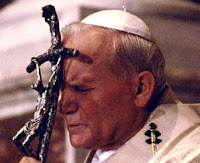 In spite of the bloodshed committed in the name of freedom, I remain free – individually, socially, politically, because of the blood shed by Christ and his countless disciples throughout the ages. They shed their own blood, not others’. That is how Christians make peace – dying to save those who hate them.
In spite of the bloodshed committed in the name of freedom, I remain free – individually, socially, politically, because of the blood shed by Christ and his countless disciples throughout the ages. They shed their own blood, not others’. That is how Christians make peace – dying to save those who hate them.
I remain ungrateful for war, its bloodshed, and its death. But my prayer is that I will always find the grace to be grateful for Christ’s victory upon the cross, for the blood shed upon it, and for the freedoms it has purchased.










